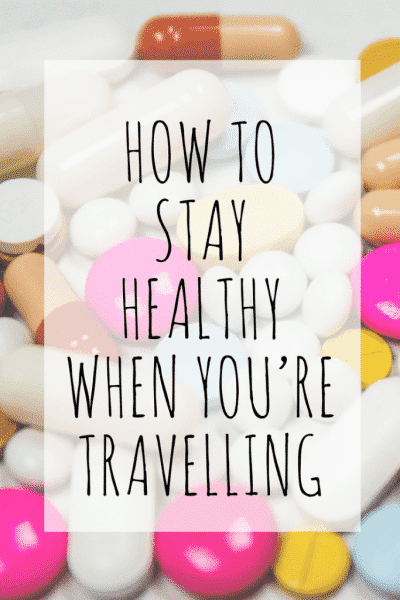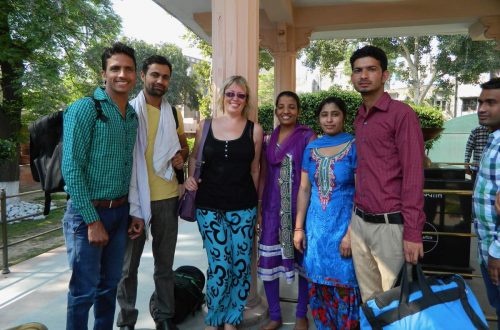
Top travel health tips you need to know
I love to travel, I really love to travel. I’ve been to more than my fair share of locations in Europe and some in North America, but I do also like a bit of culture clash, and my favourite trips are inevitably to countries in the developing world. This means that I am exposed to diseases and risks which are different from what my European body has been accustomed to for most of my life. Travel health is a topic that really is essential to consider when you are planning a trip outside of your home region, even for a short period. So how do you stay healthy when you’re travelling?
(I am an experienced traveller, not a healthcare professional. Any advice contained in this post is based on my own personal experiences, and should never replace the advice of a trained doctor or nurse).
1. Get your vaccinations
One of the jobs right at the top of the priority list when I’m booking a foreign trip is travel vaccinations. Most of us are immunised as children against a range of diseases, but they are the vaccines we need for our lives at home. In other countries, there are other risks. Most healthcare providers will recommend vaccination against tetanus, diphtheria, polio and hepatitis A as a minimum for anyone travelling abroad; for many other countries, there are additional requirements. Think you’re safe just because you’re going to a developed country or major city? Malaria, whilst mostly absent from city centres, can increase or decrease in risk according to the time of year. Dengue fever (another mosquito-borne disease) positively loves a big city. And other illnesses can spike in prevalence from season to season or year to year.
My advice: Visit your doctor or local travel clinic a few months before your trip, especially if you are visiting a country for the first time. One travel health resource I find extremely useful is NHS Fit for Travel, a site run by the UK National Health Service which provides resources to doctors and the public alike with regard to travel health. Since I’ve now been vaccinated against most diseases for which travellers are high-risk, these days I will often just check on this site before deciding whether to consult a travel clinic. But if in doubt, always see a professional.
Important: Don’t forget to keep an eye on the expiry dates for your vaccinations, and make sure you know when they need to be given again. And don’t assume that the information you received 6 months before your trip will still be valid when you actually go. After the occasion when I had a week to source malaria tablets for Indonesia because the advice had changed, I’ve learned my lesson and always check again a few weeks before I travel.
2. Buy travel insurance
I used to assume that EVERYONE got travel insurance, so I was horrified to discover how many people don’t bother. I can understand the arguments – I’ve never yet been able to claim for lost baggage or flight delays because something in the small print always caught me out, and, on the few occasions I’ve needed to buy medicines or see a doctor on my travels, the cost has always been so cheap that it wasn’t worth the effort to put in a claim. Us non-Americans are well aware that we need insurance to travel to the US, but what about other countries? Well, think about it: if you get into a car accident in India (let’s face it, not impossible!), would you rather be treated in the local hospital or that big international private hospital in Delhi? If you need surgery and there’s an expert in your home country, how are you going to get there if you need medical evacuation? I’ll promise you now that you can’t afford to pay for it yourself. So I would never dream of skimping on the travel insurance, even if I only end up using it in a dire emergency. And make sure you declare those pre-existing conditions. You can be sure the insurers will invalidate your insurance if they find out later that you didn’t mention your back problem.
3. Take vitamins
When we’re on the road, for a short trip or a long one, it can be pretty hard to eat healthily. Maybe we’re in an affluent country and the fast food and alcohol is so tempting – and I mean, we’re on holiday, aren’t we? Or perhaps we’re in a remote part of Africa and the menu choices are limited. Keeping to a balanced diet can be difficult, and keeping as healthy as we can is essential to enjoying our trip and fighting off any pesky bugs from germ-filled public transport or food that’s maybe not quite as safe as it could be. My answer to this is to take a good multivitamin, at least for the length of the journey. It’s amazing how much good it can do.

4. Sanitise
Let’s be honest, there are some countries in the world where – amazing though those countries are – it’s just not possible to keep to the standards of hygiene you do at home. We are so accustomed to lack of germs that we visitors can suffer horrendously from handling money, using bathroom facilities etc. – situations that the locals are completely immune to. Make sure that you carry hand sanitiser at all times, and use it every time you would really prefer to wash your hands but can’t. Hand sanitiser has come on leaps and bounds in recent years, and if you shop around you can get some pretty nice-smelling ones, so what’s your excuse?
5. Stay out of the midday sun
Now, this one is more for the northerners amongst us. As a reluctant English rose, I find the first few days in a hot climate a bit of a challenge, and it doesn’t seem to help in the slightest how many times I’ve done it. For the first 3 or 4 days I am invariably prone to overheating, headaches and nausea, however careful I am. Minor discomfort is one thing, but if you don’t act on these warnings, heat stroke can be fatal within a few hours. Wherever possible I try to keep out of direct sunlight, and get in to the air conditioning (or at least the shade) as often as possible. That’s sometimes harder than you’d think when I’m with a group, but I make sure the tour leader is aware, and always insist on getting a break regardless – nobody is looking out for my own health as well as I am, so if I need to walk off I will do. I invariably find it passes after a few days, so it’s not forever.
Incidentally, the top advice on surviving heat is generally to drink more because you sweat more in hot climates. That’s true, but what I only found out a few years ago (after a full afternoon and evening stuck in my hotel room in Seoul after overheating) is that our bodies self-regulate sweat based on what they normally need to produce. So if you’ve jumped on a long haul flight from a cool climate to a hot one, it’s going to take your body a few days to realise it needs to sweat more to cool itself down. Keep drinking those fluids, definitely, but understand that for the first few days they will not help with the heat and you still need to get in the shade as much as possible. You’ll know when you’ve acclimatised once the sweat kicks in!
6. Get advice on antibiotics from a trusted source – and then buy them locally
Just before my last trip to India, I ended up at my doctor’s with an ear infection. When I mentioned I was about to fly to India, he whipped out a Post-It note and wrote down the name of an antibiotic. It turns out he had recently returned from a trip to India himself, and wanted to pass on the details of the drug that works wonders on a dose of Delhi belly. Inevitably, a fellow traveller on that trip was struck down quite seriously, so I passed on the details and she was well enough to travel 24 hours later with the help of my newfound wonder drug, which had only cost $1.50 from a local store. If you have a friend in the medical profession, it’s always worth asking for suggestions. I now stock up on this antibiotic any time I’m in a country where it’s sold over the counter – I’m sparing about taking it, but it’s reassuring to know that, for a minimal cost, I have it with me.
7. Protect against the mozzies
Now, I’ll own up on this one: I’m not very good at this myself and always come home from trips with polka dot ankles from getting attacked every evening. But it really does make sense to use insect repellent, and cover up in the evenings. Not only do mosquito bites itch like hell, but not every mosquito-transmitted illness can be vaccinated against. Fancy a bout of dengue fever or zika virus? I didn’t think so.
Top tip: You don’t need to take huge quantities of mosquito repellent with you from home. Just take a small bottle to last you until you can get to a supermarket or drugstore, then buy the stuff the locals use. If it’s popular locally, you can bet it works better against the local insects than what you brought with you.
8. Go veggie
Now, this is a happy coincidence for me: because I don’t eat meat, I am less exposed to salmonella and other bacteria than my carnivorous friends. I do eat fish, though, so when I’m travelling to countries with less strict hygiene laws I am relatively careful about the seafood I eat: prawns, in particular, I will only eat near the coast. But as a general rule, if you stick to the vegetarian options you are at far lower risk. And in countries like India the vegetarian options are incredible, so why wouldn’t you?
9. Carry diarrhoea medication – lots of it!
Even being careful, I’m prone to getting dodgy stomachs when I travel; sometimes through eating bad food, sometimes just from the unfamiliar cuisine and hot climate. You don’t want to be caught short when you fall ill – let’s face it, you tend to need the drugs before you are well enough to get to the pharmacy! Buy the unbranded version (in the UK, look for Loperamide as the active ingredient), which is pretty cheap and ALWAYS worth the investment. It’s also a great way to make friends – nothing makes you a hero in your fellow traveller’s eyes like flashing your drug stash when they’re desperate!
10. Accept that, however hard you try, you’re going to get sick occasionally
None of us set off on our travels with the intention of making ourselves ill, but it does happen. Go prepared, with a stash of all the medications you would normally turn to at home – cold & flu tablets, decongestants, band aids, antiseptic lotion and anything else you turn to in a pinch. Don’t go mad – with the exception of the diarrhoea medication, you only need a few of each to tide you over until you get to a shop – but plan ahead so you know you can treat illness and injury quickly and independently. I would also recommend carrying a bandage for those twisted ankles from the cobblestones, or that torn calf muscle from walking in a straight line (yes, that happened to me, and yes, I was sober). Just pack yourself a little first aid kit, throw it in the bottom of your bag and hope you never need it – but pat yourself on the back when you do.
There are so many other travel health risks – DVT (deep vein thrombosis), altitude sickness, and many more – all of which are worth some research depending on your trip. But so many illnesses can be avoided or treated using the 10 rules above. Travel health is an important part of any overseas experience, but with a bit of preparation you can minimise the risks, put it out of your mind and enjoy your adventures!
If you’re looking for more travel advice and inspiration, check out these posts!
- Destination Africa: The best African countries to visit
- Best places to visit in the Middle East
- 9 Amazing animal experiences from around the world!
- The World is a Book: What travel means to me
- Small group travel: Is it right for you?
Save this post for later!






8 Comments
http://www.luckies.co.uk/gifts/travel/
Hi! I am Julia, being a newbie to blogging I mostly visit blogs listed at ShoutmeLoud and link of your blog readingthebook, I’ve seen there. So visited here and found you have a really cool blog. You look so professional and highly educated to blogging. Can you share some useful tips to successful blogging? Thanks
Jill Bowdery
Oh wow – I’m glad I look that way! I’m relatively new to it myself really. My best advice is to join some Facebook blogger groups – they are a brilliant source of advice on everything blogging, as well as being a great way to get your blog posts shared to a wider audience. Try Female Travel Bloggers as a starting point. But also listen to their advice, but then do your thing. Everybody’s blog is different, and yours needs to be true to you and also fun for you to write. Good luck!
Hannah
I got screwed over once on travel insurance- never again! I learned my mistake and thankfully it didn’t cost much in the end but still not nice. The mozzies are a big one too, I was so worried about getting Dengue in SE Asia! Thankfully didn’t.
Alice
Great tips. I also do most of these but learned a few new ones too.
Lisa
What’s your advice to people who like street food? Just avoid?
Jill Bowdery
No, I eat it!! Just don’t eat food that’s been standing around, and depending on the country I’d avoid chicken (if I were a meat eater!). If the food is well cooked and freshly made I’d go for it, there’s always a risk but you can get food poisoning in a fancy restaurant… But if your gut says no, then wait till you find somewhere you’re more comfortable with…
Jill Bowdery
Oh no, that’s such a horrible story! Thank goodness most trips don’t end up like that!
Some great tips from you too… and thanks for reminding me about the water one (how did I forget that?!). Personally I always carry a water bottle with a built-in filter, then use only bottled water in the riskier countries even if I’m still going to filter it again. And check the seals on the bottles before you drink them, to make sure they are intact from the factory and not already opened or even glued back together. I did get very ill once from a water bottle that wasn’t sealed properly, so I can’t believe I missed it off!
Meg | MeanderWithMeg
I support all of these tips – you can never be too careful with your health, especially travelling. For me, my number one rule is drink lots of water. It’s incredible how dehydrated I feel after a few hours of exploring so I always keep a bottle of water on me and refill often! In extremely hot climates, adding a tiny bit of sugar (like a cordial) helps your body absorb the electrolytes otherwise the water just goes straight through you!